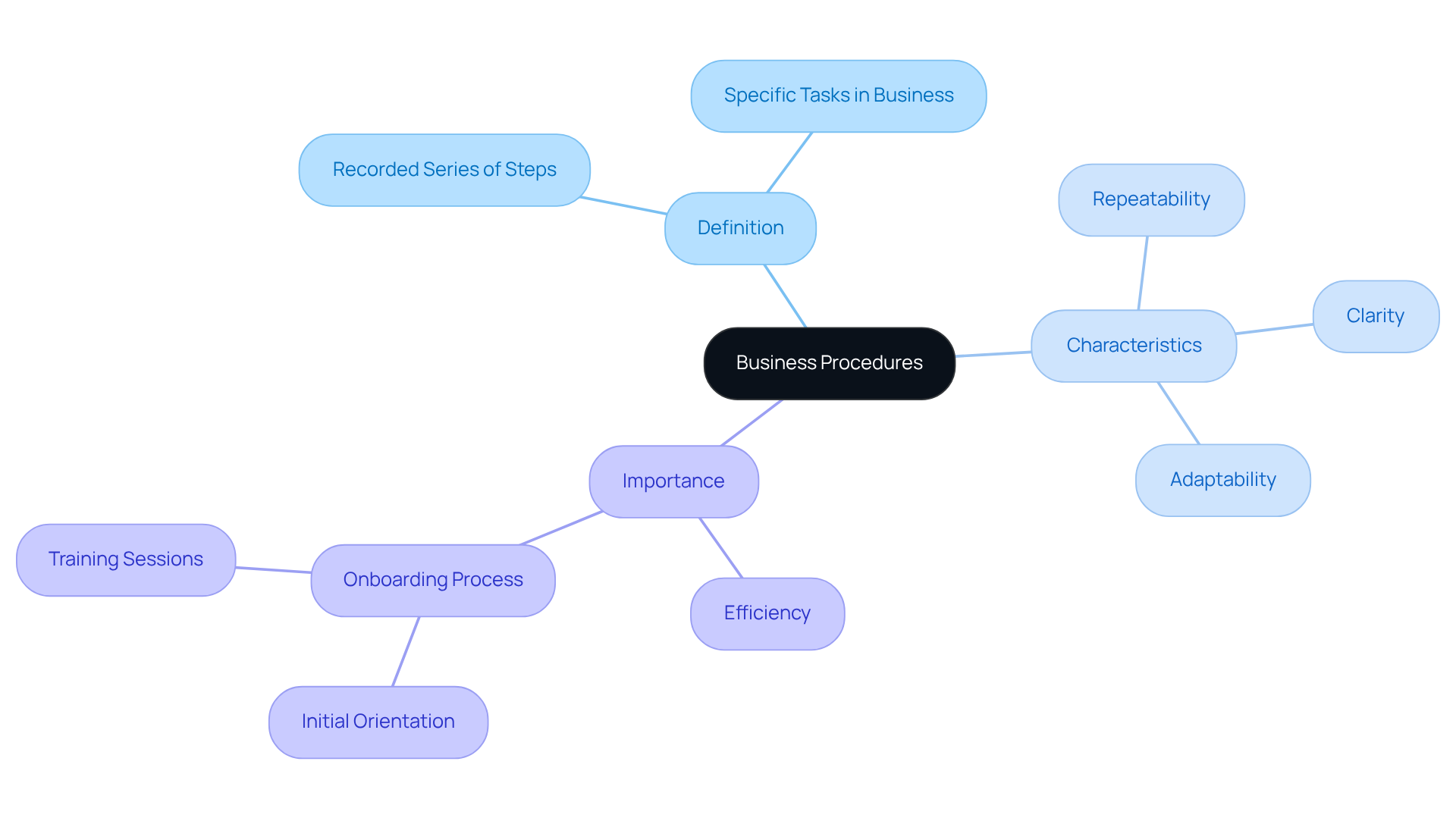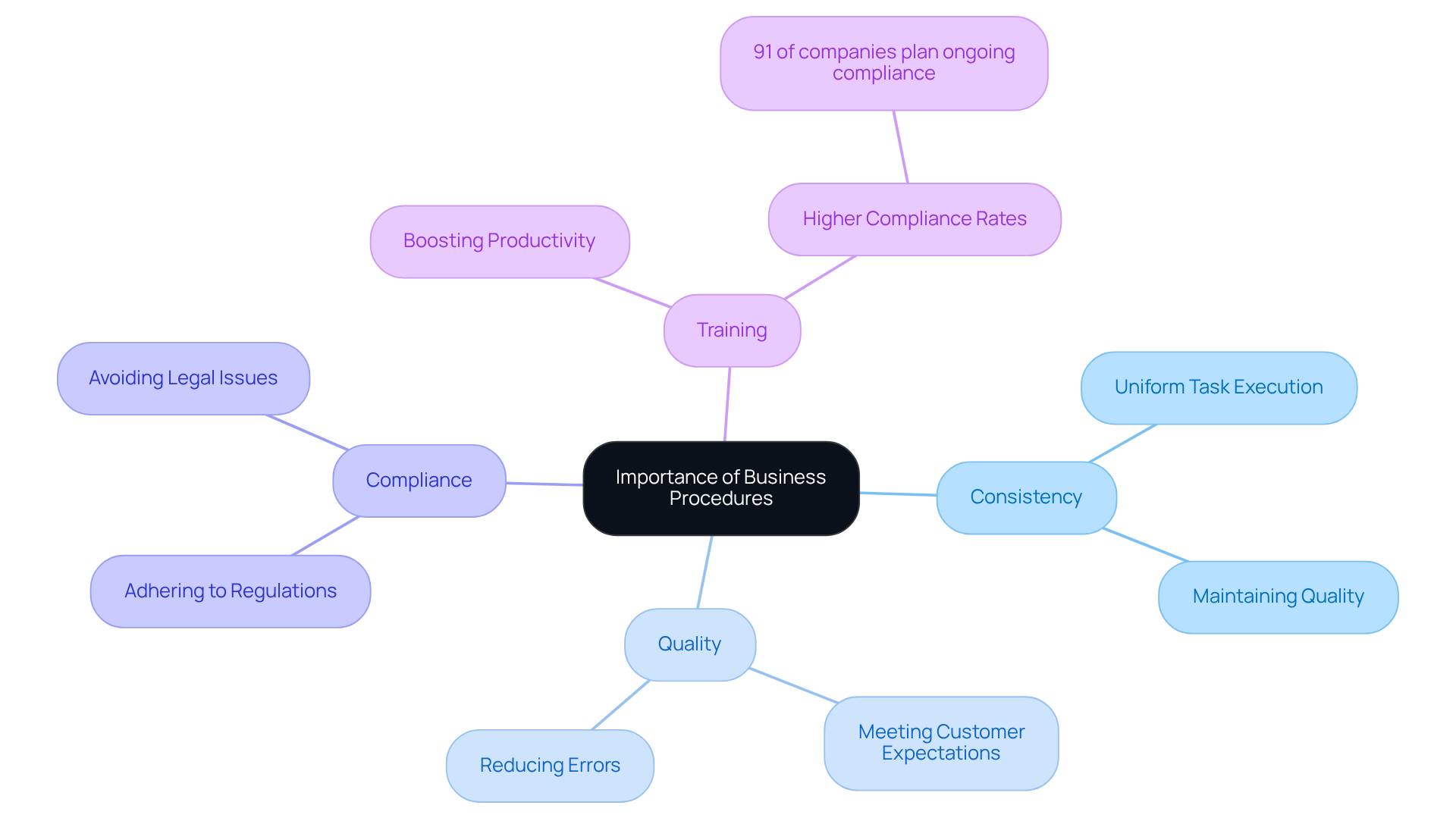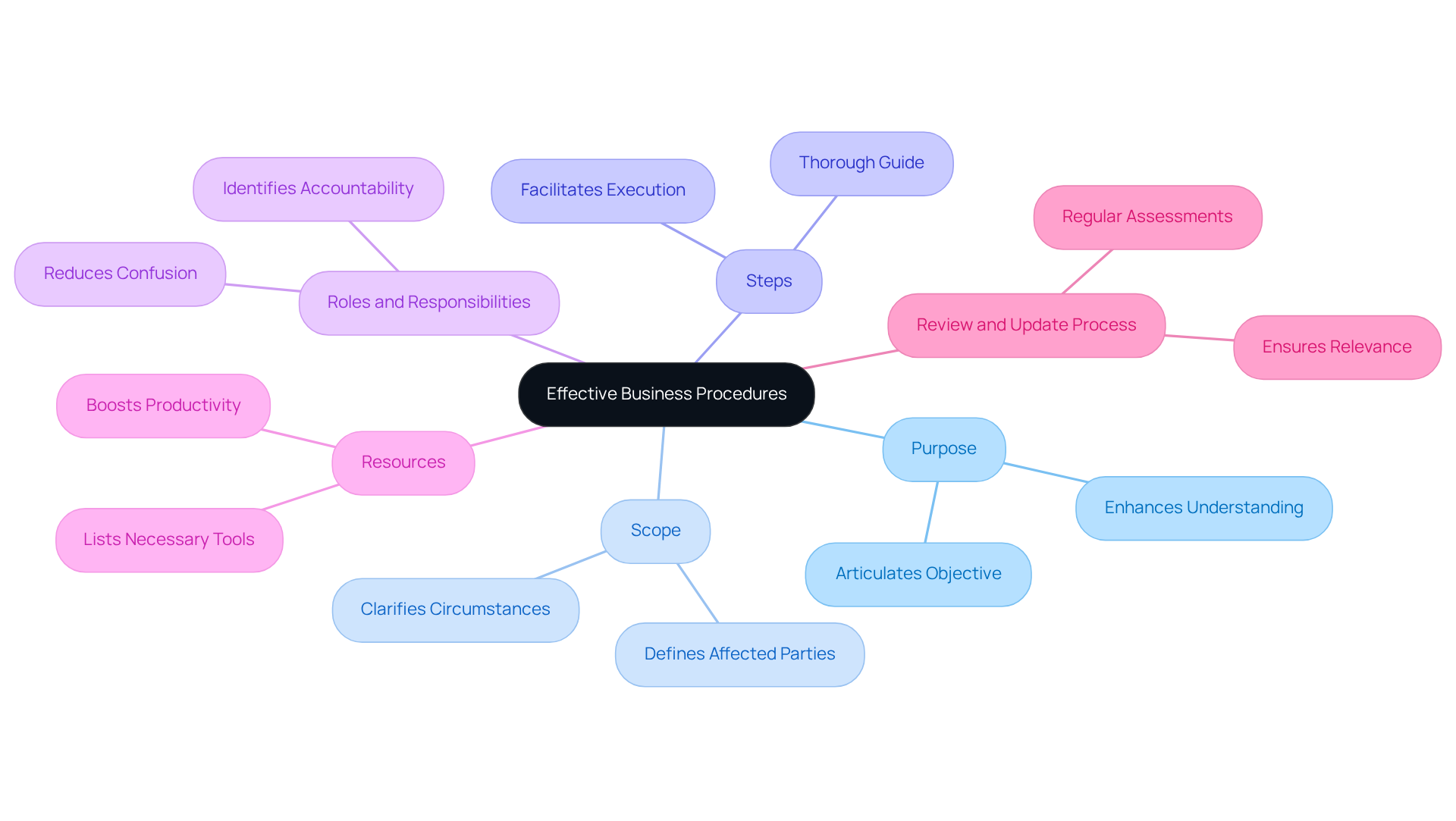
Overview
You might be wondering why business procedures are such a big deal. Well, they’re actually structured steps that help organizations stay consistent, efficient, and compliant. Think about it: when everyone knows what they’re supposed to do, things run a lot smoother! Key components include:
- Clarity
- Defined roles
- A solid review process
These work together to boost operational efficiency and cut down on errors. This, in turn, leads to better performance and keeps you on the right side of regulations. So, let’s dive into how these elements can really make a difference for you!
Key Highlights:
- Business procedures are recorded steps outlining how tasks should be performed, ensuring consistency and efficiency.
- Efficiency in business processes is characterised by clarity, repeatability, and adaptability.
- Structured onboarding processes for new employees enhance operational efficiency and reduce errors.
- Well-documented procedures maintain quality, meet customer expectations, and adhere to regulations, preventing legal issues.
- Transparency in processes improves training and onboarding, leading to increased productivity.
- Organisations with documented procedures have higher compliance rates, with 91% planning ongoing compliance in the next five years.
- Effective business procedures include clearly defined purpose, scope, steps, roles, resources, and a review process.
- Incorporating these components fosters continuous improvement and operational efficiency.
- Organisations using Business Process Management (BPM) report a 40% reduction in errors and improved decision-making.
Introduction
You might be wondering why understanding the ins and outs of business procedures is so crucial for any organization aiming for success. Well, these structured processes do more than just keep things running smoothly—they help ensure consistency, efficiency, and compliance with industry standards. As businesses face an ever-evolving landscape, the real question is: how can organizations effectively put these procedures into practice and keep them going strong to boost performance and cut down on mistakes? By exploring the core elements and importance of business procedures, we can uncover the secrets to achieving operational excellence and fostering sustainable growth.
Define Business Procedure: Core Concepts and Characteristics
You might be wondering what a corporate process really is. Well, it’s basically a recorded series of steps that show how specific tasks should be performed within a business procedure. These business procedures are crucial because they help ensure consistency, efficiency, and that everyone is on the same page with organizational standards.
So, what makes a business process efficient? Think clarity, repeatability, and adaptability. For instance, consider the onboarding process for new employees. It might lay out every step from the initial orientation to training sessions, making sure all new hires get the same information and support. This structured approach not only boosts operational efficiency but also helps reduce the chances of errors and miscommunication.
Now, let’s dive into why this matters for you. By having clear business procedures, you can streamline your tasks and create a smoother experience for everyone involved. Plus, it makes tackling challenges a whole lot easier!

Highlight Importance: Why Business Procedures Matter
You might be wondering why business procedures are so important. Well, they help keep things consistent across the board, making sure that tasks get done the same way no matter who’s handling them. This uniformity is key for maintaining quality and meeting those all-important customer expectations. Plus, having well-documented business procedures is crucial for adhering to industry regulations and internal policies, which can really help avoid any legal headaches. Take healthcare, for example—following established protocols can mean the difference between ensuring patient safety and facing liability claims.
Now, let’s talk about how transparency in processes can boost training and onboarding. When new staff can easily grasp their roles and responsibilities, productivity tends to skyrocket. In fact, studies reveal that organizations with documented business procedures see higher compliance rates, with a whopping 91% of companies planning to embrace ongoing compliance within the next five years. This trend really underscores how organized operational practices can enhance consistency and improve overall performance.
Speaking of improvements, Anastasia Masadi, a Product Owner, puts it perfectly:
'SowFlow has been a game changer in the way we document work and deliver to our clients. I do not have to take each screenshot separately, and do not even have to leave the browser while I am creating SOPs and training materials. SowFlow gave me time from my life back.'
So, why not book a demo and see how it can help you too?

Identify Key Components: Elements of Effective Business Procedures
You might be wondering what makes effective business procedure tick. Well, they’re built on a few essential components that really drive clarity and efficiency. Let’s break it down:
-
Purpose: First off, it’s super important to clearly articulate the objective of the procedure. This helps everyone understand its significance and how it relates to their work.
-
Scope: Next, defining who the procedure affects and under what circumstances keeps it relevant and useful. You don’t want anyone feeling lost, right?
-
Steps: Now, a thorough, step-by-step guide on what actions need to be taken is key. This not only clarifies things but also makes execution a breeze.
-
Roles and Responsibilities: It’s also crucial to identify who’s accountable for each step. This reduces confusion and builds accountability within the team.
-
Resources: Don’t forget to list the necessary tools, documents, or systems. This helps everyone complete their tasks efficiently, boosting productivity.
-
Review and Update Process: Finally, having a method for regularly assessing and updating these processes is vital. It ensures they stay relevant and effective in our ever-changing business world.
Incorporating these components not only strengthens operational efficiency but also fosters a culture of continuous improvement. As W. Edwards Deming wisely said, 'If you can't describe what you are doing as a process, you don't know what you're doing.' This really highlights the need for a well-defined business procedure that can adapt to our evolving needs. Plus, organizations that nail these elements can look forward to better performance and fewer errors. In fact, companies using Business Process Management (BPM) often report a whopping 40% reduction in errors and improved decision-making. How cool is that?

Conclusion
You know, understanding the significance of business procedures is really essential for organizations aiming for operational excellence. These structured processes not only help with consistency and efficiency but also play a crucial role in ensuring compliance with industry standards. When organizations implement well-defined business procedures, they can streamline their operations, minimize errors, and boost overall performance.
Throughout this article, we’ve highlighted some key insights into why business procedures matter. We’ve looked at how they help maintain quality across tasks, the perks of transparency in training and onboarding, and what makes these procedures effective. By emphasizing clarity, accountability, and adaptability, it’s clear that organizations prioritizing these elements are better positioned for success in today’s competitive landscape.
Now, given all this information, it’s pretty clear that investing in robust business procedures isn’t just a best practice—it’s a necessity for long-term growth and sustainability. So, why not take a moment to assess your current processes? Embrace continuous improvement and consider innovative solutions like Business Process Management (BPM) to boost efficiency and cut down on errors. By doing this, businesses can not only meet but exceed customer expectations, leading to greater success and resilience in an ever-evolving market.
Frequently Asked Questions
What is a business procedure?
A business procedure is a recorded series of steps that outline how specific tasks should be performed within a business.
Why are business procedures important?
Business procedures are important because they ensure consistency, efficiency, and alignment with organizational standards among employees.
What characteristics make a business process efficient?
An efficient business process is characterized by clarity, repeatability, and adaptability.
Can you give an example of a business procedure?
An example of a business procedure is the onboarding process for new employees, which details every step from initial orientation to training sessions.
How do clear business procedures benefit an organization?
Clear business procedures streamline tasks, create smoother experiences for everyone involved, and make it easier to tackle challenges while reducing errors and miscommunication.
👍
What others are liking
5 Steps to outline your ideal documentation structure
5 MINS READ
Where to start the your journey of mapping out your ideal documentation structure, aligning it with the very heartbeat of your organization?
Defining a winning level of detail in your process
3 MINS READ
What is too much detail, and what is too little? This article described in that winning level detail about what detail is enough.





